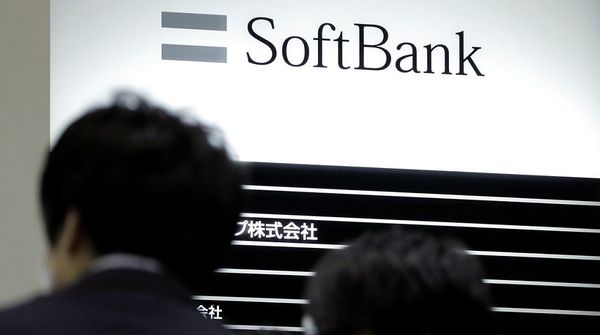SoftBanks Huge Debt Pile Turns Investors Skittish About Stability Of Sons Empire

Investors are growing increasingly skittish about the stability of Masayoshi Son’s empire.
Son’s SoftBank Group Corp., one of Japan’s most indebted companies, had been chipping away in recent years at concerns about its ability to carry that burden. As the founder remade the telecom company into a tech investor, analysts reassessed the debt in terms of the value of SoftBank’s shareholdings, a gauge that had made its balance sheet appear more manageable.
But the coronavirus pandemic is threatening to undo that progress, as it pulls down equity markets and triggers the worst sell-off in credit markets since the global financial crisis. It’s sparked a dramatic surge in spreads on bonds and the price of insuring against defaults around the world, including SoftBank’s. The company’s credit-default swaps have spiked to the highest in a decade.
“SoftBank has refinancing needs and constantly faces new fundraising needs, so it would be difficult to access funds if the current credit market turmoil continues,” said Hiroyuki Nishikawa, an analyst at S&P Global Ratings. The base scenario still remains that SoftBank has cash reserves to repay a debt for the next two years, he added.
SoftBank didn’t immediately provide comment.
S&P cut its outlook on the group to negative late Tuesday, citing the broad market declines and the conglomerate’s plans for a share buyback. SoftBank shares plummeted as much as 12%, the largest intraday decline since 2012.
The company is more vulnerable because of missteps at the Vision Fund, the $100 billion investment vehicle that Son established to become the new centerpiece of his empire. The founder used the money to take stakes in scores of marquee startups, including WeWork and Uber Technologies Inc.
But WeWork flopped in its effort to go public last year and fueled broader concern about the prospects for other money-losing startups. SoftBank engineered a $9.5 billion bailout for WeWork and had to take enormous writedowns on the value of its portfolio.
Then last month, activist investor Elliott Management Corp. disclosed a stake in SoftBank, arguing its shares were undervalued and that Son should buy back as much as $20 billion. SoftBank said on March 13 it would spend up to 500 billion yen ($4.7 billion) buying shares.
S&P responded by cutting its outlook for SoftBank, saying the decision “strongly underscores its aggressive financial management.”
The company has traditionally enjoyed strong support from individual bond investors in Japan, thanks to the ubiquity of its brand in the country. The SoftBank name is on one of the largest wireless carriers, Japan’s leading web portal and the champion Fukuoka SoftBank Hawks baseball team. The question is whether this bedrock will hold if the current market turmoil persists. SoftBank has about 2.3 trillion yen of bonds and loans coming due in the next three fiscal years.
Son has argued that he has more than enough assets to cover the debts. The company’s most liquid investments, its stakes in Alibaba Group Holding Ltd. and the SoftBank Corp. telecom unit, are worth about 13 trillion yen and 4.6 trillion yen respectively. Chipmaker Arm Holdings Plc, owned entirely by SoftBank, is worth 2.7 trillion yen by the company’s own calculations.
”Clearly the bond market is worried, but we keep coming back to the Alibaba stake, which can more than cover SoftBank’s outstanding debt,” said Dan Baker, an analyst at Morningstar Investment Management Asia Ltd. “Selling during this turmoil means they would have to do it at a lower price, which might make it a last resort.”
SoftBank is taking steps to preserve cash. This week, the company told shareholders of WeWork that it could withdraw from an agreement to buy $3 billion of stock in the embattled co-working business.
Son has said that he wants to keep SoftBank’s loan-to-value ratio, a key metric looking at its net interest-bearing debt against the value of investments, below 25%. S&P said that the gauge would likely be about 30%-35% in the coming year or so.
“The announced buyback is a reminder that all strategic decisions will be taken by Masa Son, who in the face of market uncertainty continues to put SoftBank equity over creditors, without so much as a nod to risk management,” analysts at CreditSights including Mary Pollock wrote in a note.
Bloomberg
Indian Food Delivery Unicorn Zomato Likely To File For IPO Next Month
Food delivery unicorn Zomato is planning to file for an Initial Public Offering (IPO) by April which could raise $65... Read more
Vietnams Bamboo Airways Aims Third-quarter Listing With Market Cap Of $2.73b
Vietnam’s startup Bamboo Airways said on Friday it aimed to list its shares on a local stock exchange in the thi... Read more
Didi Chuxing Advances IPO Plans To Next Quarter, Targets $62b Valuation
Chinese ride-hailing giant Didi Chuxing Technology Co. is accelerating plans for an initial public offering to as early... Read more
Warburg-backed Kalyan Jewellers IPO Loses Shine, Sees Tepid Demand
Kalyan Jewellers India Ltd’s initial public offering was oversubscribed by just 1.28 times on Thursday, a sign of tep... Read more
Chinese E-commerce Platform DMall Hires Banks For Over $500m US IPO
Chinese e-commerce platform Dmall (Beijing) E-commerce Co has hired Bank of America, Goldman Sachs and JPMorgan for a... Read more
Tencent-backed Chinese Software Firm Tuya Eyes $915m In US IPO
Tuya Inc., a software company backed by New Enterprise Associates and Tencent Holdings Ltd., is on track to raise $915 ... Read more

